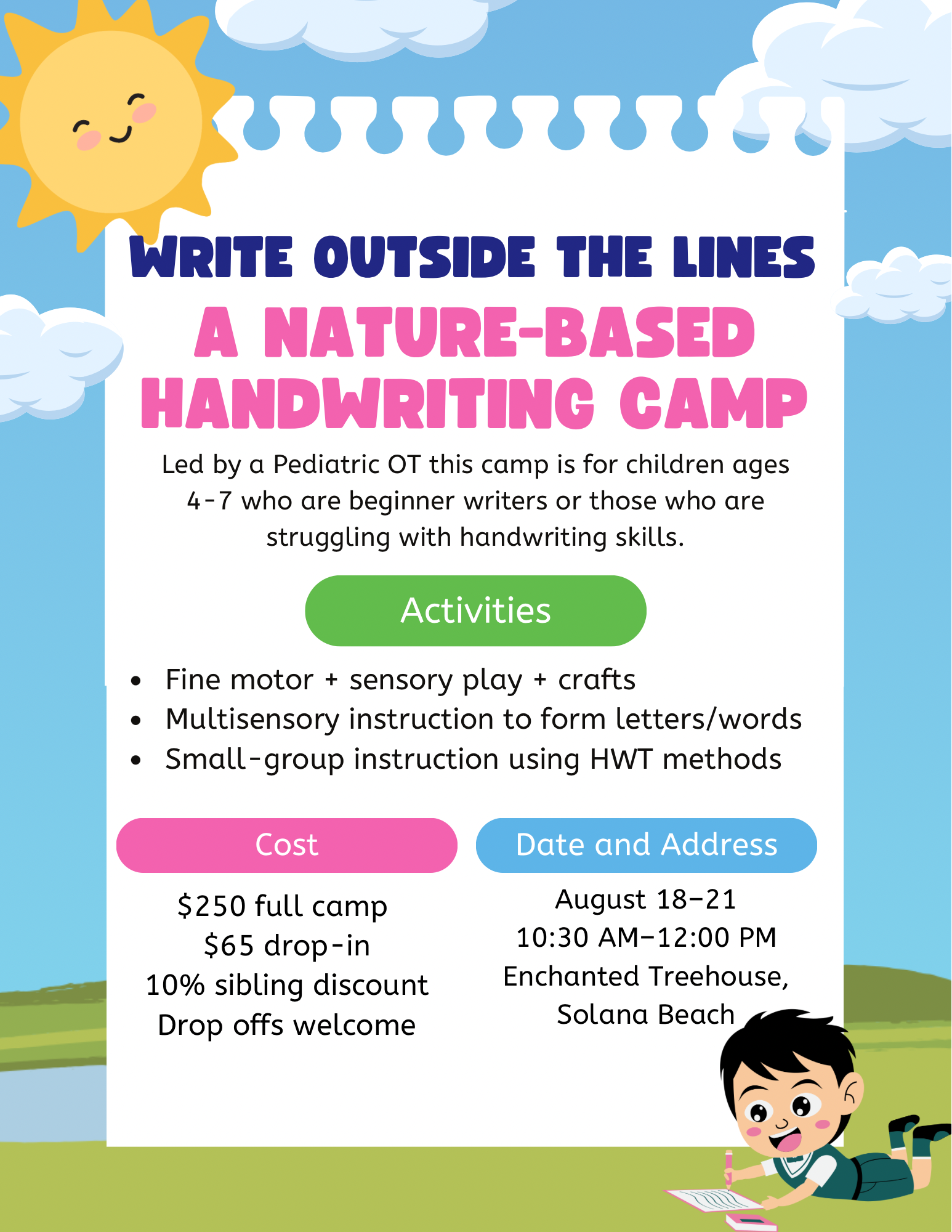October 13, 2024
Creating a Sensory-Friendly Halloween Experience: Tips to Help Your Child Enjoy the Festivities Halloween can be an exciting and fun-filled holiday for many children, but for kids with sensory processing differences, the day’s activities—costumes, trick-or-treating, and the general buzz of excitement—can become overwhelming. As a pediatric occupational therapist, I understand the importance of ensuring that your child enjoys the holiday in a way that feels safe and comfortable for them. In this blog, I’ll explore how to make Halloween more sensory-friendly, with tips on creating a comfortable costume, planning a quiet trick-or-treat route, preparing for sensory breaks, setting clear expectations, and offering fun alternatives. Understanding Sensory Sensitivities Before diving into specific tips, it’s essential to understand why Halloween can be so challenging for children with sensory processing difficulties. Sensory processing refers to the way the nervous system receives messages from the senses and turns them into appropriate motor and behavioral responses. For some children, sensory inputs like loud noises, unfamiliar textures, or bright lights can be overwhelming, causing anxiety, discomfort, or even meltdowns. Halloween, with its mix of strange sights, sounds, and textures, can be a sensory overload waiting to happen. But with some thoughtful planning and strategies, you can ensure your child still enjoys the festivities. Let’s break down some practical ways to create a sensory-friendly Halloween. 1. Choose a Comfortable Costume For many children, one of the highlights of Halloween is picking out their costume. However, costumes often feature itchy fabrics, uncomfortable accessories, or tight-fitting components that can be challenging for children with sensory sensitivities. When choosing a costume for your child, comfort should be your top priority. Tips for Selecting a Comfortable Costume: Opt for familiar clothing: If your child is uncomfortable with the feel of typical store-bought costumes, consider a DIY approach using their everyday clothes. For example, a soft T-shirt with their favorite character or animal can still make for a fun, creative costume without causing discomfort. Test it out early: Have your child wear the costume well in advance of Halloween to ensure it feels comfortable and doesn't cause irritation. This will also allow them to get used to any new textures or materials. Remove uncomfortable accessories: Skip any extra accessories like hats, masks, or gloves that your child finds annoying or distracting. A simple headband or face paint may be more tolerable alternatives. Layer with soft fabrics: If the costume is made from an itchy fabric, consider layering a soft undershirt or leggings underneath. This will create a barrier between your child’s skin and the costume. By ensuring the costume feels good on their body, your child will be able to focus on the fun rather than being distracted by discomfort. 2. Plan a Quiet Trick-or-Treat Route and Practice Ahead of Time Trick-or-treating is often the centerpiece of Halloween for many children, but the activity can be overwhelming due to the unfamiliar environment, loud sounds, and crowds. Planning ahead can help your child feel more comfortable and prepared for the experience. Tips for Planning a Trick-or-Treat Route: Choose a quiet route: Opt for neighborhoods or areas that are less busy or have fewer houses participating. This will reduce sensory overload from large crowds, bright lights, and excessive noise. Go early: Start your trick-or-treating adventure early in the evening before it gets too dark and when fewer people are out. This can make the experience more manageable for children who are sensitive to overwhelming stimuli. Familiar locations: Stick to homes or neighborhoods that your child knows well. Familiarity can provide a sense of comfort and reduce anxiety in new or unpredictable environments. Practice Makes Perfect: Children with sensory challenges often feel more at ease when they know what to expect, so practicing trick-or-treating in advance can help reduce anxiety. Role-play: Before Halloween, practice the trick-or-treating routine at home or with a friend. Knock on doors, say "trick or treat," and give your child a chance to experience the process in a safe, low-pressure environment. Visual schedules: If your child benefits from visual aids, create a simple schedule showing the steps of trick-or-treating, from putting on their costume to ringing doorbells to receiving candy. This will help them understand the sequence of events. By preparing ahead of time, you can set your child up for success and help them feel more confident when the big night arrives. 3. Prepare for Sensory Breaks Even with the best planning, Halloween can still become overwhelming for your child. That’s why it’s essential to plan for sensory breaks throughout the evening. These breaks will give your child time to regulate their sensory system and prevent them from becoming too overstimulated. Tips for Sensory Breaks: Create a calming space: Whether you’re trick-or-treating or attending a Halloween event, have a designated quiet area where your child can retreat if they become overwhelmed. This could be a quiet room at home, the car, or a designated spot along your trick-or-treat route. Use sensory tools: Bring along your child’s favorite sensory tools, such as noise-canceling headphones, fidget toys, or a weighted blanket, to help them feel more comfortable during sensory breaks. Set time limits: Let your child know that it’s okay to take breaks as needed. If they need to leave early or take a breather after a few houses, honor those feelings to help them stay regulated. Deep pressure activities: Deep pressure input, such as tight hugs, squeezes, or using a weighted vest, can help calm and regulate the sensory system. Offer these calming inputs if you notice your child becoming overwhelmed. Sensory breaks allow your child to reset, preventing meltdowns and helping them continue to enjoy the evening at their own pace. 4. Set Clear Expectations Uncertainty or changes in routine can be stressful for children with sensory processing differences. Setting clear expectations ahead of time will help your child understand what to expect during Halloween and reduce any feelings of anxiety. Tips for Setting Expectations: Talk about the plan: Go over the evening’s schedule in advance, explaining the steps of trick-or-treating or any parties you’ll be attending. Be clear about how long you’ll be out, what you’ll do if they feel overwhelmed, and when they can take breaks. Use a timer: If your child benefits from time cues, use a timer or visual countdown to let them know how long each part of the evening will last. This could be for time spent trick-or-treating, attending a party, or even wearing their costume. Discuss social expectations: Prepare your child for what to say or do during trick-or-treating, such as greeting neighbors and saying "thank you" after receiving candy. If social interactions feel challenging, consider role-playing these moments ahead of time. Reassure them: Let your child know that it’s okay if they don’t want to participate in every aspect of Halloween. If they decide not to wear their costume or want to stop trick-or-treating early, reassure them that their comfort comes first. Setting clear expectations helps alleviate the anxiety of the unknown and allows your child to feel more in control of their experience. 5. Offer Alternatives to Traditional Halloween Activities While trick-or-treating and dressing up in costumes are Halloween staples, they’re not the only way to enjoy the holiday. Offering sensory-friendly alternatives can give your child more control over their experience while still allowing them to celebrate in a way that suits their needs. Alternative Halloween Activities: Host a small gathering: Instead of going out for trick-or-treating, consider hosting a small Halloween party at home with a few close friends or family members. This allows your child to celebrate in a familiar, controlled environment. Trunk-or-treat events: Some communities offer trunk-or-treat events, where families decorate their cars and hand out candy in a parking lot. These events are often smaller and quieter than traditional trick-or-treating and may be a more sensory-friendly option. Halloween-themed sensory bins: Create a Halloween sensory bin filled with themed items such as plastic spiders, squishy eyeballs, and fake cobwebs. Your child can explore different textures and engage in sensory play without the overwhelming stimuli of trick-or-treating. Pumpkin decorating: Instead of carving a pumpkin, try decorating it with stickers, markers, or paint. This allows your child to engage in a fun Halloween craft without the sensory discomfort of slimy pumpkin guts. Providing alternatives ensures your child can still enjoy the holiday, even if traditional activities are too overwhelming. Final Thoughts Halloween doesn’t have to be overwhelming for children with sensory sensitivities. With a little bit of planning, flexibility, and a focus on your child’s comfort, you can create a fun, memorable holiday experience for them. By choosing comfortable costumes, planning a quiet trick-or-treat route, preparing for sensory breaks, setting clear expectations, and offering alternatives, you can help your child enjoy the excitement of Halloween while minimizing sensory overload. Remember, the goal is for your child to have fun in a way that feels safe and manageable for them. Every child is different, so feel free to adapt these tips to suit your child’s unique needs. Here’s to a happy, sensory-friendly Halloween! As a pediatric OT, I love helping adapt activities to meet your child's needs. Feel free to contact me for a FREE social story on trick-or-treating!











